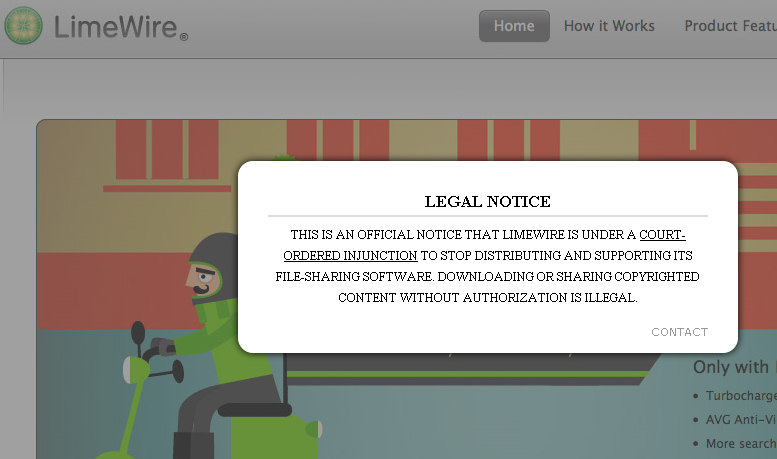Judge slaps Lime Wire with permanent injunction
U.S. District Court Judge Kimba Wood orders LimeWire to disable downloading and uploading and otherwise quit being LimeWire.

The end of Lime Wire as it has existed for years appears to be at hand.
U.S. District Judge Kimba Wood issued an injunction today against the company that operates the long popular file-sharing software LimeWire and orders managers there to disable "the searching, downloading, uploading, file trading...and/or all functionality" of the LimeWire software, Lime Wire announced.
In May, Wood, who serves the Southern District of New York, granted summary judgment in favor of the music industry's claims that Lime Group, parent of LimeWire software maker Lime Wire, and founder Mark Gorton committed copyright infringement, engaged in unfair competition, and induced copyright infringement.
LimeWire, the software, was released 10 years ago and quickly emerged as one of the favorite ways to pass pirated music across the Web. Gorton and his company have acknowledged making millions from offering the software.
"While this is not our ideal path, we hope to work with the music industry in moving forward," a Lime Wire spokesperson said in a statement. "We look forward to embracing necessary changes and collaborating with the entire music industry in the future."
Lime Wire continues to exist but no longer operates as a file-sharing service, the spokesperson said. Exactly what the New York-based company will do in the future is unclear. At this point, the company's chances of licensing music for Spoon appear to be small and its prospects dim.
Legacy software
Obviously, there is little that the court can do about software that is already released. But in her order, Wood tried to close the door on any further releases, upgrades, advertising of the software, or the creation of any comparable software in the future. She also wants Lime Wire to do its best to discourage the use of the LimeWire software already in the wild, what she called "legacy software."
"Using its best efforts," Wood wrote, "Lime Wire shall use all reasonable technological means to immediately cease and desist the current infringement of the Copyrighted Works by Legacy users through the LimeWire System and Software and to prevent and inhibit future infringement of copyright works."
She ordered Gorton and employees to establish "default settings in the legacy software that block the sharing of unauthorized media files" and offer users tools to remove the software from their hard drives. Wood ordered Lime Wire to create a copyright filter that would work on legacy software. In addition, Wood required Gorton and crew to first get the permission of the music labels before building any new, legal version of LimeWire.
However Lime Wire disables their client, there are plenty of alternative file-sharing software and networks available. Indeed, BitTorrent has emerged over the last few years as a much more popular way to share files.
Spoon
But for Gorton, the injunction is not the end of his or his company's troubles. The Recording Industry Association of America, which filed the copyright complaint against Gorton and Lime Wire in 2007, will now seek damages that could easily top $1 billion. That phase of the trial is scheduled to begin in January. A group of music publishers has also filed a copyright complaint against Lime Wire.
According to music industry sources, Gorton and the RIAA were in settlement negotiations for a long time as the judge deliberated over whether to impose the injunction.
Gorton offered to license music from the top four record companies for Spoon, Lime Wire's little-known legal music service. The deal fell through after Gorton's lawyers insisted that the music labels allow LimeWire to continue to operate for a year so users could be moved over to Spoon.
The labels totally rejected the idea. RIAA lawyers have told the judge that LimeWire costs the record labels about $500 million every month in lost revenue. They wouldn't wait a year. They wouldn't wait a month. They assert they have taken a beating from Lime Wire for too long.
"For the better part of the last decade, Limewire and Gorton have violated the law," the RIAA said in a statement. "The court has now signed an injunction that will start to unwind the massive piracy machine that Lime Wire and Gorton used to enrich themselves immensely."

